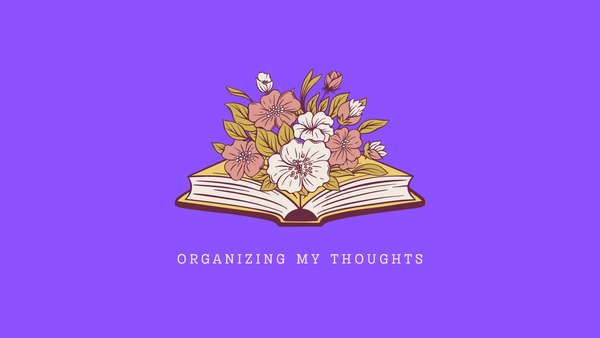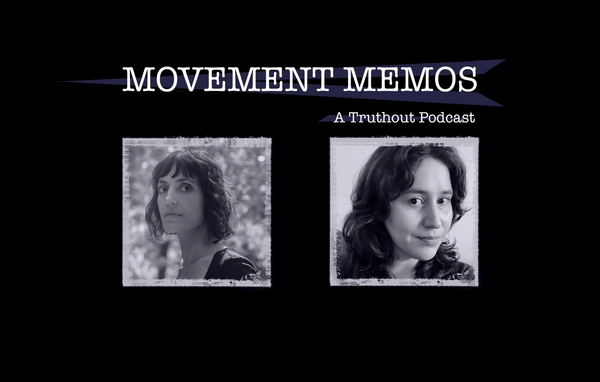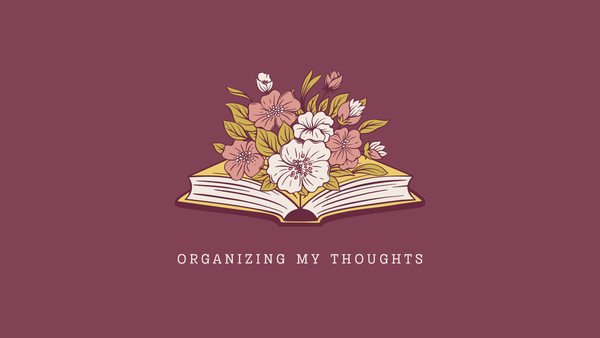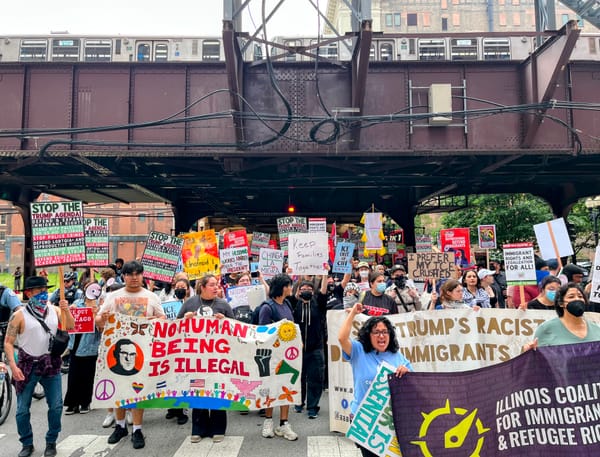Must-Reads and Navigating Depression in Catastrophic Times
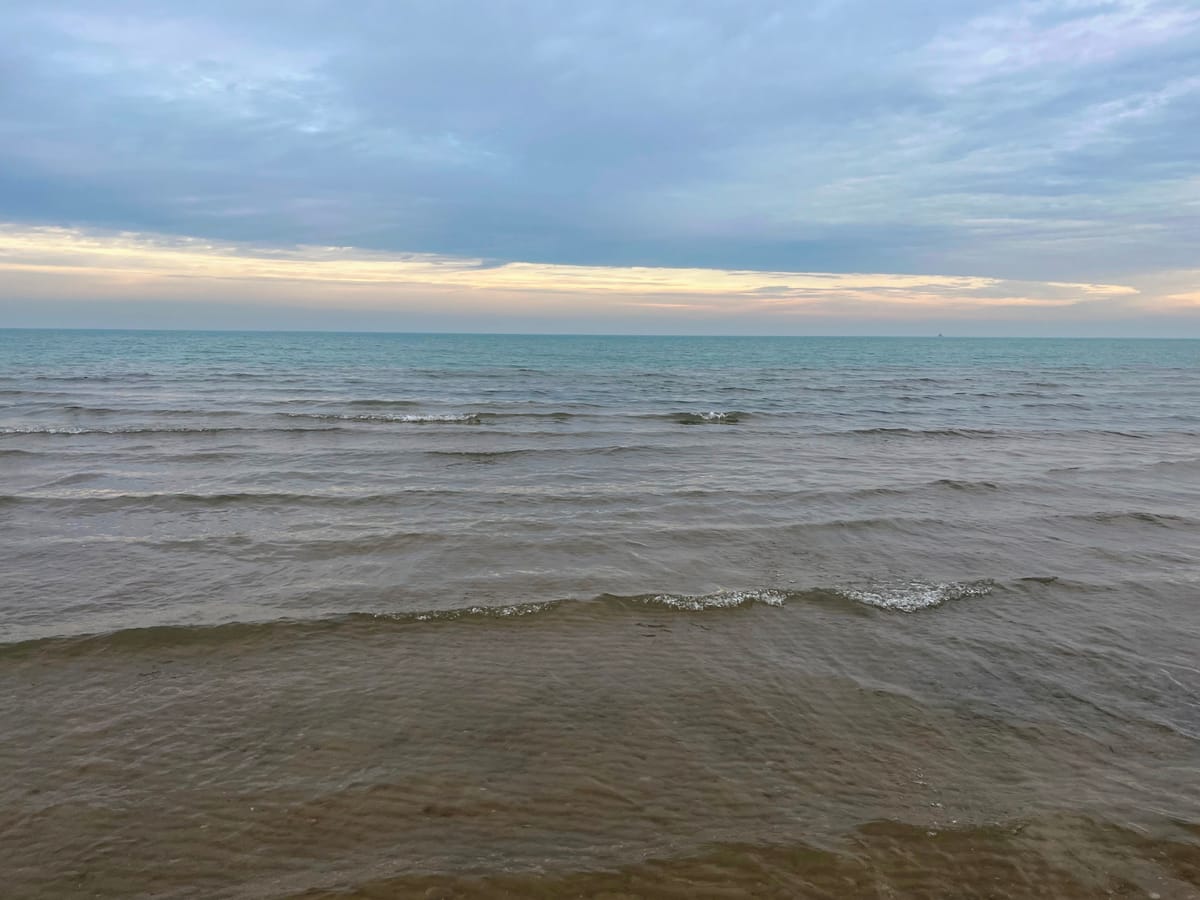
Your weekly list of must-reads is here, but first, there’s a new episode of Movement Memos that I hope you’ll check out. I talked with Palestinian author and educator Eman Abdelhadi and Alex, a student organizer, about what we can learn from the recent wave of Palestine solidarity encampments and where we should direct our energies in this moment of transition.
“The flagpole in the midst of campus was empty, and the students raised the Palestinian flag,” Abdelhadi said. “It brought me a sense of wholeness and a sense of safety and a sense of comfort that I honestly haven’t felt in at least seven months. And it’s something I’ll never forget. It’s something that even in the few days that I’ve been on campus since the encampment, I look at the empty quad, and I see the quad from the encampment in my memories.”
People have been telling me that this episode is their new favorite and that it moved them to tears “in the best way,” so if you need some inspiration in these times, consider checking it out. If you need a transcript, you can find that here.
Must-Reads
From the criminalization of protest and COVID safety to falling parole rates and what it’s like to be an abortion doula, here are some important stories you may have missed this week.
Life As an Abortion Doula by Meagan Jordan. “‘I believe every person deserves to have the kind of abortion that they want to have, the kind of pregnancy that they want to have,’ [said Ash Williams].”
Scenes From a MAGA Meltdown: Inside the “America First” Movement’s War Over Democracy by Andy Kroll. “What divides the Republican Party of 2024 is not any one policy or ideology. It is not whether to support Donald Trump. The most important fault line in the party now is democracy itself.”
How to make spaces more accessible during the continuing pandemic by Emily Dupree and Shelby Seier. “A blueprint for radical inclusion and living a full, safer life within the context of Covid-19 exists.”
Under Glenn Youngkin, Parole in Virginia Has Nearly Vanished by Isabela Dias. “Under past Democratic administrations, Virginia already had one of the harshest parole systems in the nation, with single-digit annual approval rates. But parole grants have declined even further since Republican Governor Glenn Youngkin began to overhaul the parole board in 2022, dipping to an approval rate of just 1.6 percent in 2023.”
How to Criminalize a Protest by Zak Cheney-Rice. “To the best of Ahmed’s knowledge, RICO has never been used against a group like this. By claiming that a diffuse but broadly aligned social movement equals organized crime, prosecutors are saying protesters could find themselves subject to a Mafia-style trial because some random guy broke a window. ‘If it includes everyone,’ Ahmed adds, ‘then why is it a criminal conspiracy?’”
Inside Georgia’s Crusade to Make Bail Unpayable by Nia T. Evans. “Drafted by aggrieved private bail companies eager to neutralize a threat to their $2 billion dollar bottom line and promoted by the American Legislative Exchange Committee (ALEC), a right wing think tank, the bill is a perfect vehicle for GOP lawmakers to champion law and order policies while expanding a highly profitable bail system that has been abandoned by nearly every nation in the world except the US and the Philippines.”
Israeli soldiers and police tipping off groups that attack Gaza aid trucks by Lorenzo Tondo and Quique Kierszenbaum. “Settlers intercepting the vital humanitarian supplies to the strip are receiving information about the location of the aid trucks from members of the Israeli police and military, a spokesperson from the main Israeli activist group behind the blockades told the Guardian.”
The Pentagon’s .00035% Problem by Nick Turse. “Late last month, the Department of Defense (DoD) released its congressionally mandated annual accounting of civilian casualties caused by U.S. military operations globally. The report is due every May 1st and, in the latest case, the Pentagon even beat that deadline by a week. There was only one small problem: it was the 2022 report.”
Anti-Mask Laws Target Gaza Protests, But They Threaten All Progressive Movements by Lewis Raven Wallace. “These laws threaten to effectively criminalize anyone attempting to protect themselves — whether from political repression or airborne illness.”
University of California Student Workers Begin Historic Political Strike against Repression and Genocide by Olivia Wood. “As the state intensifies its ongoing repression of the movement for Palestine, labor actions such as this can, and will, play a definitive role in the future of the movement. If more sectors of labor enter the stage of struggle in this way, we can shift the balance of forces in our favor.”
Google is Paying Reddit $60 Million for Fucksmith to Tell Its Users to Eat Glue by Jason Koebler. “Screenshots of Google’s AI search going awry have gone repeatedly viral and highlight how hellbent the company is on giving its customers the most frustrating possible user experience while casually destroying the livelihoods of people who work for or make websites.”
Final Thoughts
I have been on a roller coaster in recent years, trying to manage my various health problems. The physical symptoms of adjusting to new prescriptions and ceasing the use of medications seems like an endless cycle. I have lost so much time to side effects and cessation symptoms and, this week, I am honestly at my wit’s end. I will have more to say about my health struggles in future essays, as I do feel that some of these experiences may be relevant to others. For example, I have been meaning to write about my positive experiences with ketamine infusions, which offered me a much-needed psychological reset earlier this year, amid a terrible bout of depression. Unfortunately, this is not a good week for me, writing wise. I struggled to pull this week’s episode of Movement Memos together. Listening to Eman and Alex share their insights was an absolute joy, but every other task the show requires was exhausting.
I have been going on longer walks lately, which I find helpful. The improving weather allows me to spend more time outside. I often joke with my friends that I am “chasing” feel-good neurotransmitters on these walks, and honestly, it’s true. I discovered last summer that very long walks could be as effective as antidepressants for me–which is to say, not entirely effective, but certainly better than nothing.
My health issues are both physical and psychological, and as many of you surely know, there is no clean division between the two. When neurological distress signals ricochet through our bodies, we feel them, regardless of causation. On a similar note, I don’t spend much time trying to parse how much of my depression is clinical in nature and how much is rooted in real-world events. There is always cause to be sad, and the horrors of this moment are especially unsettling. For those of us who do not treat environmental catastrophes and ongoing genocides as mere background noise, there is heartbreak embedded in the very fabric of our reality. When I pursued ketamine therapy, I remember telling my provider that I did not consider my emotions unreasonable or disproportionate, and that I was not trying to become “well-adjusted.” What I was looking for was a way to survive my own awareness. I talked about Star Trek, and about how sometimes the Enterprise travels into unstable zones where heat or other hostile conditions threaten to destroy the ship. Thanks to enhanced shields, or the superior hull strength of the Federation’s flagship, our heroes always seem to survive such drama, in spite of the damage done. “That’s what I want,” I said. “More hull strength.” I need the strength to navigate conditions that are not conducive to hope, joy or survival. I need the strength to be myself and remain in alignment with my values, even if the world falls down around me. I need the hull strength to navigate a world on fire.
I’m working on it. When pharmaceuticals fail me (which is most of the time), active hope inches me through each day. I am not an optimistic person. In a recent conversation, I said that I was hopeful, and someone countered that, in contrast to my position, they were worried. I did not argue, but the truth is, I am always worried. It would be folly to move through this world without worry. I am constantly concerned for my community, for the biosphere, for the political future of our movements, and for every creature on this earth. I know too much not to be worried. So, I try to stay constructive. I focus on the outcomes I want and the values that I want to see expressed, and I take whatever small steps I can in those directions. That’s my practice of hope. When it’s hard to move, I inch onward, or at least, resist moving backward toward despair. I have spent years of my life in hopeless places. I refuse to return to those dark roads. My anger and anguish are part of me, but if I yield to their influence, in all things, I will become cynical. I refuse to be ruled by cynicism when there is love, decency and comradery in the world. I do not say this to condemn anyone’s state of mind, but rather, as an assertion of my own agency. Life has taught me that things will get better and worse, and that the journey is worth it. We’re all worth it.
For those who feel guilty about attending to their own needs or capacity for happiness amid so much suffering, I want to tell you what I told a group of burnt out students recently: “Your misery is not compensating for anyone else’s misery. Your unmet needs are not meeting anyone else’s needs. If anything, your hurt, left untended, is compromising your ability to tend to the hurt of others.”
We all need each other, and that means we need you, too. So, take care of yourselves, friends. Rest, refuel, and stay in the fight. You are loved here.
Much love,
Kelly
Organizing My Thoughts is a reader-supported newsletter. If you appreciate my work, please consider becoming a free or paid subscriber today. There are no paywalls for the essays, reports, interviews and excerpts published here. However, I could not do this work without the support of readers like you, so if you are able to contribute financially, I would greatly appreciate your help.

